posted by Writer on Aug 5
 “The safest place to be”, I was told more than once, “is right in the center of God’s will”…It might, in fact, be safe to be in the Center of God’s will-but we would be wise to stop and think what it means to be safe. I felt that I had lived a life in response to the call of God. Instead of effective ministry, measurable results, and what might pass for success, I felt mostly loss and heartache and failure.” Nik Ripken, Author, The Insanity of God – A True Story of Faith Resurrected.
“The safest place to be”, I was told more than once, “is right in the center of God’s will”…It might, in fact, be safe to be in the Center of God’s will-but we would be wise to stop and think what it means to be safe. I felt that I had lived a life in response to the call of God. Instead of effective ministry, measurable results, and what might pass for success, I felt mostly loss and heartache and failure.” Nik Ripken, Author, The Insanity of God – A True Story of Faith Resurrected.
A former cop pointed me toward this book and I must confess, it blew me away. Those of you who know me, know I’m not a touchy-feely and that I hate man hugs.
However, this book impacted me what this man, Nik Ripken, which is not his real name, went through to obey God’s call to bring Christ to people living in a toilet called Somalia.
I was embarrassed for myself after reading what true believers, those who know what it means to live with Jesus on a daily basis, endure on His behalf.
One of those persecuted saints said this to Nik; “DON’T YOU EVER GIVE UP IN FREEDOM WHAT WE WOULD NEVER GIVE UP IN PERSECUTION-AND THAT IS OUR WITNESS TO THE POWER OF THE RESURRECTION OF JESUS CHRIST!”
We’re giving up while fellow believers, who know the risks of standing for Christ in Totalitarian cultures, do it regardless.
“On March 23, 1775, when Patrick Henry spoke the now famous phrase, “Give me liberty or give me death!” to arouse the Second Virginia Convention to arms against the tyranny of Great Britain, he noted that “We have done everything that could be done to avert the storm which is now coming upon us.” During the critical years of 1765-1776, the American colonies had been forced to endure taxation without representation, searches and seizures without probable cause, the confiscation of firearms, and on and on. Though the colonial leaders had tried to remain loyal to the Crown and reconcile their differences, they were finally compelled to break away in revolt.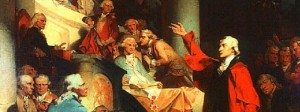
In The Declaration the Founders articulated to the world their reasons for separating from the Crown.
“But while the Declaration gives a detailed list of legal offense that England had left unresolved, the Founders saw these as more than isolated wrongs. Rather, they saw them as part of a predetermined plan to take away religious liberties and reestablish the Church of England to rule over their hearts and souls, thus enslaving the colonies. In that light, one understands the power of Patrick Henry’s fiery words.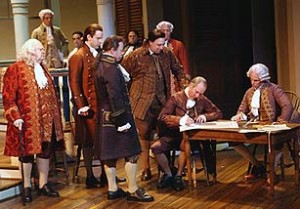
Faced with such prospects, The Declaration stated that the American colonists were set to defend “the laws of nature and of nature’s God” – words that define the principle upon which the Founders stood. The laws of nature were understood to mean the will of God for man as revealed to man’s reason. However, because man is fallen and his reason does not always comprehend this law, God gave His law in the Bible to make it absolutely clear.
THUS, IT WAS THE CHURCHES THAT became the primary source that stirred the fire of liberty, telling the colonists that the English government was usurping their God-given rights, and the King and Parliament were violating the laws of God. The Founding Fathers were convinced that it was their sacred duty to start a revolution to uphold the law of God against the unjust and oppressive laws of men. And the fight for political liberty was seen as a sacred cause because civil liberty was an inalienable right, according to God’s natural law.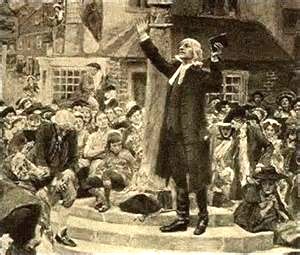
The New England ministers, in particular, were decisive in rallying the popular moral support for war against England. They pressed their congregations to overthrow King George because they believed that rebellion to tyrants was obedience to God. From many pulpits, ministers recruited troops and strengthened them in battle with patriotic sermons.
While the church leaders were well schooled in the fact the Bible placed great emphasis on due submission to civil authorities (Romans 13), they noted there are also many passages that approve resistance to ungodly authority. For instance, when the apostles were commanded by the Sanhedrin to cease from preaching that Jesus Christ had risen from the dead, Peter boldly asserted: “We ought to obey God rather than men” (Acts 5:29).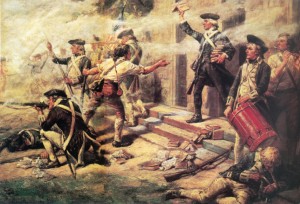
Therefore, it is no coincidence that one of the watchwords of the American Revolution was “No King but KING JESUS.” For most of the patriots, their faith gave them the courage to stand on God’s Word and risk their lives and properties to break the tyranny of an unjust human authority. In their Christian worldview, obedience to God took precedence over country or government, and their primary allegiance was to the Lord Jesus Christ.
Indicative of this spirt, in 1775, the Lutheran pastor John Peter Gabriel Muhlenberg preached a sermon on Ecclesiastes 3:1, “To everything there is a season, a time for every purpose under heaven.” Concluding the message, he declared, “In the language of the Holy Writ, there is a time for all things. There is a time to preach and a time to fight. And now is the time to fight.” He then threw off his clerical robes to reveal the uniform of a Revolutionary Army office. That afternoon, at the head of 300 men, he marched off to join General Washington’s troops and became Colonel of the 8th Virginia Regiment.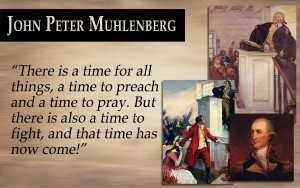
Ministers turned the colonial resistance into a righteous cause and served at every level in the conflict, from military chaplains to members of state legislatures to taking up arm and leading troops into battle. 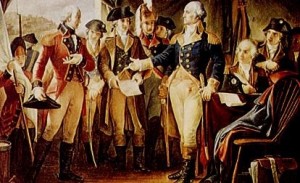
And, ultimately, after two main British armies were captured by the Continental Army at Saratoga in 1777 and Yorktown in 1781, the other words of Patrick Henry to His fellow Virginian proved true: “Three millions of people, armed with the holy cause of liberty, and in such a country as that which we possess, are invincible by any force which our enemy can send against us.” (1)
(1) – Annonymous.
Leave a Reply